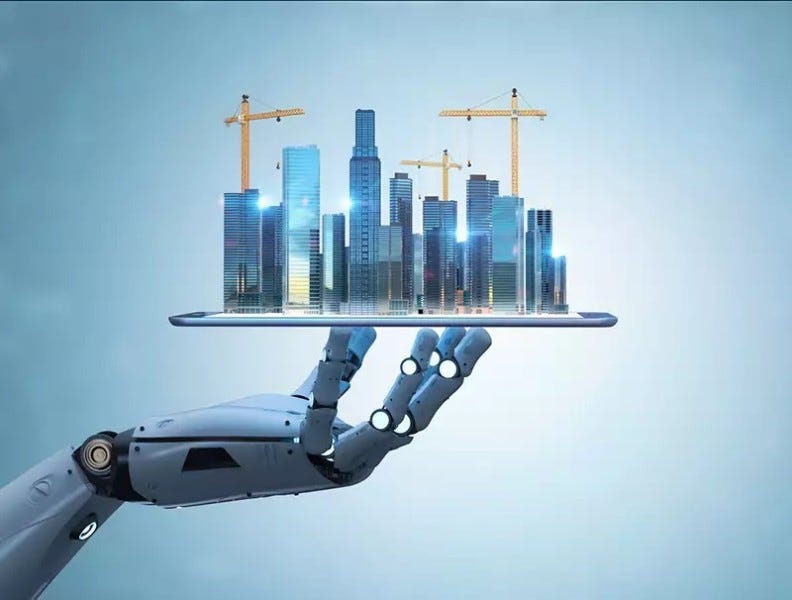AI in Manufacturing
- Posted by Deepak Shukla
- Categories Blog, College, Corporate, Individual, Trainers
- Date June 10, 2024
- Comments 0 comment

Introduction
In today’s world, AI is dramatically changing how factories work, making them smarter and more efficient. Not only is AI enhancing production capabilities, but it is also revolutionizing every aspect of the manufacturing process.
This article explores how AI is transforming manufacturing, highlighting key features, benefits, challenges, and the future of AI-powered factories. Furthermore, it delves into how AI-driven technologies are shaping the future of production, ensuring industries remain competitive and innovative.
Through understanding these advancements, we can better appreciate the synergy between AI and industry, paving the way for the factories of tomorrow.
Key Features of AI-Enhanced Factories
- Predictive Maintenance
- Sensors and IoT Devices: These tools monitor machines in real-time to predict when they need fixing, reducing downtime and extending machine life.
- Machine Learning Models: These models analyze data to predict problems before they happen, helping plan maintenance better.
- Quality Control
- Computer Vision: This technology checks products during production to find defects and ensure high quality.
- AI Algorithms: These algorithms learn from past defects and improve inspection processes over time.
- Supply Chain Optimization
- Demand Forecasting: AI predicts demand trends, helping manage inventory better and reduce waste.
- Logistics and Routing: AI optimizes shipping routes and schedules, improving delivery times and cutting costs.
- Production Planning and Scheduling
- Dynamic Scheduling: AI adjusts production schedules in real-time based on changes in orders, machine availability, and workforce constraints.
- Resource Allocation: AI ensures resources are used optimally, minimizing bottlenecks and maximizing output.
- Collaborative Robots (Cobots)
- Human-Robot Interaction: Cobots work alongside humans, doing repetitive or dangerous tasks while humans handle complex problems.
- Adaptability: Cobots learn new tasks quickly, making production lines more flexible.
- Energy Management
- Smart Grids: These systems monitor and manage energy use, optimizing consumption and reducing costs.
- AI-Driven Insights: AI finds ways to save energy and helps implement sustainability strategies.
Additional Features of AI in Factrories
- Real-Time Monitoring and Analytics
- Dashboards and Reports: AI systems provide real-time dashboards and detailed reports, allowing managers to make data-driven decisions quickly.
- Anomaly Detection: AI can identify unusual patterns or anomalies in production, helping to prevent issues before they escalate.
- Enhanced Worker Safety
- Safety Monitoring: AI-powered cameras and sensors can monitor worker safety, ensuring compliance with safety protocols and reducing accidents.
- Wearable Technology: Wearables can track worker health metrics, alerting them and supervisors to potential safety hazards.
- Customization and Flexibility
- Flexible Manufacturing Systems (FMS): AI allows factories to switch between different products without significant downtime, supporting customization and small batch production.
- Mass Customization: AI enables the production of customized products at scale, meeting specific customer needs efficiently.
Benefits of AI in Factories
- Increased Efficiency: AI automates routine tasks and optimizes complex processes, boosting productivity and cutting costs.
- Enhanced Flexibility: Factories can quickly adapt to changes in production demands or supply chain disruptions.
- Improved Quality: Continuous monitoring and adaptive quality control ensure products meet high standards.
- Reduced Downtime: Predictive maintenance prevents unexpected breakdowns and production stops.
- Sustainability: Better resource management and energy efficiency lead to more sustainable manufacturing practices.
- Better Decision Making: Real-time data and analytics help managers make informed decisions quickly.
Challenges and Considerations
- Integration with Legacy Systems: Upgrading existing systems to work with AI can be complex and costly.
- Data Security and Privacy: Protecting sensitive data in a connected environment is crucial.
- Skill Gaps: Workers need training to manage and operate AI systems effectively.
- Initial Investment: Implementing AI technologies and upgrading equipment can be expensive at first.
- Change Management: Adapting to new technologies requires a shift in company culture and processes, which can be challenging.
Future Outlook
In the future, factories will be highly automated, connected, and data-driven. New technologies like digital twins, augmented reality (AR), and advanced robotics will further improve manufacturing. AI will continue to evolve and integrate with other technologies like 5G, edge computing, and blockchain, opening new opportunities for innovation and efficiency. Additionally, AI will play a significant role in making manufacturing more environmentally friendly, helping factories reduce their carbon footprint and achieve sustainability goals.
As AI technology progresses, we can expect even more advancements, such as self-healing materials, which can repair themselves without human intervention, and further integration of AI into every aspect of the production process. These advancements promise a future where factories are more intelligent, responsive, and resilient.
Conclusion
The synergy between AI and industry is not just about advancing technology. It’s about creating smarter, safer, and more sustainable production environments. As this synergy grows, it promises a future where factories are more intelligent, responsive, and resilient. Through embracing these innovations, industries can thrive in a competitive landscape, ensuring long-term success and sustainability.
About the Author: Deepak Shukla is Digital Marketing and sales Cordinator at IDI Institute de Informatica. Learning for career is an Initiative of IDI that conducts courses in futuristic technologies with an aim to build SMART professionals where SMART is being Skilled, Motivated, Analytical, Resourceful and Transform people.
https://www.facebook.com/learningforcareer01
You may also like
AI Career Explosion: 50 Top Jobs Awaiting You
In the ever-evolving world of technology, Generative AI stands out as one of the most groundbreaking advancements.
Edge Computing: A Revolution at the Network’s Frontier
In the ever-evolving world of technology, Generative AI stands out as one of the most groundbreaking advancements.
From GPT-1 to GPT-4: The AI Language Revolution
In the ever-evolving world of technology, Generative AI stands out as one of the most groundbreaking advancements.

